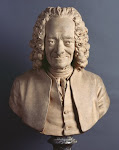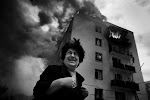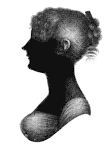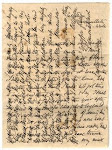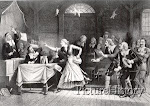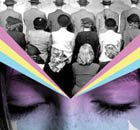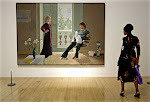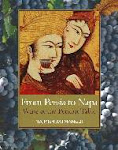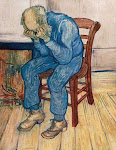Now, here’s something I know at this point in my life - ‘going back’ is an impossible exercise. Any return to a childhood scene, to a setting pervaded with the joy of some moment of success or romantic love is doomed to disappointment. First - obviously, because of the water in the river never being the same twice and all that. And second – deliberately ‘going back’ is trying too hard for something which, like happiness, depends to a large extent on giving up to sheer accident. On letting go of preconceptions, expectations.
However. Exceptional books prove the exception to this rule. It’s always worth knowing which titles work this way in other peoples’ lives.
‘A Long Way from Verona’ by Jane Gardam is a slim novel I’ve read now many times over the years – in very different circumstances too – as a thirteen year old in northern Ireland, then an undergrad in ‘English lit’, later in Spain, in Paris. And now with a daughter the same age as I was when I first read it. I’ve had this book in several editions bought or borrowed, lost or lent in turn. I’ve never found out there’s a more exact meaning to the title then that I construed in my own reading. ‘Verona’ is an arcardian ideal with Shakespearian overtones. A high literary ideal in contrast with the self-betrayals, the ridiculous blindnesses of ordinary life. Maybe that’s why I like it so much. Not for the ideal but the funniness and pain of the contrasts, the contradictions we have to live with. Like the pastor father of the narrator, a social campaigner and in wartime England who is always gentle in spite of the bitter truths doled out him by the narrator/his adolescent daughter
“ ‘oh stop being such a parson’ I said, ‘stop being so ..pleased when I am difficult so you can be understanding. You’re only thinking of you not me.’
His great big face went quite dead and he sat back. ‘I don’t know what she’s talking about’ he said to Ma.”
Part of the special flavour of this book is how the narrator gets across what it is like to live with your own prickliness for other people. It’s a great source of comedy, and makes the narrator very likeable. Other people are irritating, especially, as she herself says of herself, she's unlikeable because she always has to speak out and tell the truth.
Each time I’ve read ‘A long Way from Verona’ almost at one sitting, with emotion but also pleasure in symmetry - the sort of delight you associate with excellent music where your inner, unconscious ear predicts the cadence before it falls. (this particular joy you don’t get from the re-readings of Dostoevsky’s baggy translations every decade or so). In ‘a Long Way from Verona’ this inner expectancy is satisfied in the plot, the language, and also in how every human trait in the book is balanced by its opposite. For instance a writer called Arnold Hanger visits her school. ‘Down with school!’ English is life!’ he shouts as he is being led away by the headmistress. When I was thirteen it was a phrase I loved in the book and one that got out of my daughter a (short) laugh of approval when I read her the first chapter. (I wanted to read it aloud by the way, because although she is bilingual I thought there were very English tones she might miss..in fact it is a very ‘English’ work. It prones a very Anglo phelgmatic good-heartness in the face of the worst, like the over-worked mother who’s supposed to be batty and loveable shen she boils the fish with the linen on washing day.) The writer – visitor who changes the heroine is one of the book’s many idealists whose lives are pitiful in contrast to what they believe so deeply. This writer reads the main character’s ‘writings’ and changes her life by returning them to her with the message ‘Jessica Vye you are a writer beyond all possible doubt!’ Later, towards the very end of the book there comes a moment, beautifully orchestrated – not a climax, a throwaway moment but also a vital detail, when Jessica has read her way through enough of English literature to know what is genuine. She’s in the house of one of her parents’ friends and picks up a book she sees lying open to find it ‘full of phrases like ‘the pastel twilight’ and ‘the clear and lonely call of the curlew’ then looks at ‘the photo of the author on the front...a pipe stuck out of the side of an awful, honest sort of face. Something about his silhouette reminded me of someone.’ Of course we know what’s coming. She’s an adolescent now, depressed by the nihilism in Hardy’s ‘Jude the Obscure,’ she’s had her first crush (on an upper class boy with communist convictions that fall apart when they are caught in an air-raid together) - but she’s still enough of child to have grown-ups talk over her head,
“ ‘ Still we mustn’t lose heart’,” said Mrs Jamieson brightly, as I turned over the book to see who’d written it.
It was by Arnold Hanger.”
By this stage no comment is necessary to feel the deflation of that moment. In ‘A Long Way from Verona’ we love the characters because they go on anyway, fired by mentors, by ideals that are continually being caught out and disappointed. Occasionally the thirteen year old protagonist brushes up against real, murderous violence. A schoolteacher and fairy godmother figure who understands her completely is killed when the school is destroyed in a blitz. She wanders into a park out of school one day and meets a shellshocked Italian demob wielding a knife but too disturbed to do her any harm. But traumatising violence stays on the edges and is always healthily counterbalanced by the love and wisdom of eccentrics, by an unruffled best friend. Love and luck rule - despite our own endless thorniness with others and despite the inevitable anti-climax of living out your dreams.
Saturday, February 21
Wednesday, February 18
How long to stay with a book.
Daydreamer welcomes this post from blogauthor *Tracy Wren*
There aren't any book police out there making you finish the book. Just as there aren't any cinema police stopping you from leaving the theatre or from sneaking into the theatre on the other side of the hall. The answer to your question - how long to read a book - is, as long as you want to. The old surrealists never wanted to finish watching a movie. They just wanted to experience an emotion, a color, a movement of light. That was enough for them. Even if I were on a train going through Siberia, I wouldn't finish an obnoxious book. On the other hand, I would never read past the first ten pages of a book I didn't like in the first place. Any book I brought with me on a long train journey, would hold some merit, from my point of view. There are too many fabulous books out there that I want to read, and many I'd like to read again.
There aren't any book police out there making you finish the book. Just as there aren't any cinema police stopping you from leaving the theatre or from sneaking into the theatre on the other side of the hall. The answer to your question - how long to read a book - is, as long as you want to. The old surrealists never wanted to finish watching a movie. They just wanted to experience an emotion, a color, a movement of light. That was enough for them. Even if I were on a train going through Siberia, I wouldn't finish an obnoxious book. On the other hand, I would never read past the first ten pages of a book I didn't like in the first place. Any book I brought with me on a long train journey, would hold some merit, from my point of view. There are too many fabulous books out there that I want to read, and many I'd like to read again.
Thursday, February 12
How do you decide a book is worth reading? When do we allow ourselves to abandon a book halfway through?
The questions are an outgrowth of a very late night conversation last Saturday in the ‘Blue Lady’ a bar frequented by yachties swabs and all, near the port of Antibes. We’d just been to a one-man show at a café-theatre in the old town. The discussion over a bottle of rosé, veered from why the stand-up comic had made us laugh – or not, to taste in humour -the best funny films- to Woody Allen and why we should like him or not – to the difference generally speaking - between ‘the film and the book’ to what is it that makes you choose a good book? Our choice is reglemented by media-hype, affirmed an unconditional Woody Allen fan. Marguerite Duras for instance, he went on (Duras keeps popping up in this blog – is she a sort of Gallic couterweight to V Woolf?) who would ever read the minor, more inaccessible novels like ‘Lol V Stein’ if the critics and sale records hadn’t canonised her for landmarks like ‘Le Barrage contre le Pacifique’ and ‘Le Marin de Gibraltar?’
My own answer is reading for me is quintessentially social. It’s like moving in a circle of acquaintances. I turn from one book to another the way I talk to one and then another person in a room. The approach to the ‘conversation’ is based - very egocentrically and banally - on what we have in common. The ‘other’ –the writing - subject matter or author, resembles me in some way. Or has some relation with someone else we both know. Maybe another writer with a similar or totally opposed outlook. Or from the same time period. Or country. When I was living in Paris and read about events there during Algerian war of independence I went looking for Algerian writers. I was half-looking for ideas to flesh out my own experience in France and from growing up on the edge of a sectarian community in northern Ireland. I found Assia Djebar and Yasmina Khadra. Also Rachid or Rahim Memmouni?? Is that the right spelling? Some faces stay in your mind longer than others. All the above writers exposed me to depths and aspects of writing and experience totally outside my personal sphere. In some cases getting to know them was a memorable encounter which I took into myself. (And maybe my personality too - in the way Freud says we are all of us but “precipitates” of what other people leave in us.) However in other cases, I read pages of prose the way you walk past strangers in the street, noting a detail here and there but also uncaring, unnable to relate.
And why should this ambivalence be otherwise? Why are we so mesmerised by the aura of a ‘good book’ – a question which our fellow rosé drinker at the ‘Blue Lady’ was getting at when he spoke of the difficulty of making a personal choice. I don’t allow myself to give up on a book, he said too, with a groan. Is this guilt some sort of genetic memory leftover from the reverence of monotheistic religions for ‘the holy book? As if starting to read is a moral commitment to some sort of integrity. Why the bafflement and dullish self-doubt when we can’t get reaction out of ourselves? Or when an ‘official’ great like Thomas Mann (whose ‘Dr Faustus’ I’ve never been able to read), or a fashionable name like Murakami leaves us cold – I loved ‘Sputnik Sweetheart’ but couldn’t get past the first chapter of ‘Kafka sur le Rivage. ’ Following a holiday in Croatia, I read a collection of testimonies from the war in Bosnia which until today has left me unable to read the pre-war classic ‘The Bridge over the Drina’ lent me by a friend from the same part of the world. We don’t want to accept that even the god and goddess writers have their duds. Did anyone out there read Doris Lessing’s ‘Love, again?’ - without cringing? Books that live beyond a feat of wordy distraction have their own time and place. Dostoevsky’s ‘Crime and Punishment’ for instance, taken in non-stop stretched out on a sunbed the summer I was fourteen was just right for the sort of adolescent I was in 1978 and certainly marked me for life. Whereas trying to get through Henry James’ ‘Portrait of a Lady’ two summers later was a waste of time. Many more years of the heart were necessary for me to admire the finesse and understanding of those paragraph wending, winding sentences.
Of course, as a sometime fiction writer and lifelong ponderer on how to write a good one, all books are relevant to me. What have they got that I haven’t is what I want to know! Are all readers writers? There’s definitely that spice of jealousy in the company I keep with books. And a real tang of nostalgia too when I step into a bookshop, as if for a place where I used to be happy as I will never be again, in childhood maybe, the new paper smell as strong as the whiff of Proust’s madeleine.
If I may be allowed to digress from the written word – concerning Woody A. I have to say I love the earlier work, where Diane Keaton is young, but then I went off him around the scandal surrounding his affair with his adoptive daughter. All those lovably muttering, humbled self-portrayals of the later films like ‘Manhattan Murder Mystery’ feel like so many pleas for titillating sympathy. (In parenthesis the scenarios set in London ring false. Brits don’t sound like the characters in ‘Matchpoint’ – film which the French adore. And they are definitely embarrassingly NOT like the brothers in ‘Cassandra’s Dream’). Of course not liking the films because of the gossip rags drooling over his personal life goes to prove the point above on our ‘manufactured’ choices, mere reflexes of mediatised hype. So how should we allow ourselves to personally censor our reading and other choices? What I mean is how moral should we be in separating a good book from the opinions or lifestyle of the author? Personally I have never been able to get through Céline, to return to the TS Eliot I used to love, or to touch much of Pound because of all of these writers’ anti-semitism. On the other hand I would never vote for these books to be burnt in a public place. How do we estimate the human price of a work of art? I was very impressed in my early twenties and in the depths of a literature degree by Bruno Bettelheim's 'The Informed Heart' where he cites the ravages wrought on the children/family of geniuses. Einstein's unvisited daughter wasting away in her mental home, Joyce's daughter, Beethoven's nephew? Was it worth it? wondered Bettleheim. Couldn't we have swopped the ninth symphony for one person's release from suffering? He was writing in the post-second world war period when thinkers wondered over photos of piled corpses about the connection between art and human rights. Today I like Bettelheim's question but think it has to be left at just that - a question which should never be put aside - and for which the answer is a mystery.
Nevertheless our personal taste is inescapably moral too. Everyone has his or her limits. There are people in the world (my partner included) who were once so steeped in a propaganda system that they read every single line of print as a kind of trick working out its hidden ideology on the reader. Even your enemies influence you, goes a Persian proverb. That’s one extreme. The opposite is that we forget how good writing seduces us into an illusion of universal truth. Soaks the reader in one single human being’s feel of the world and makes us feel this is the whole, the sum total. The despair of Hardy’s ‘Jude the Obscure,’ or the brilliant jagged anger of Plath’s Esther Greenwood in the ‘Bell Jar’ for instance, the violent erotic pessimism of D.M Thomas in ‘Pictures at an Exhibition’ or Michel Houllebecq’s ‘Atomised’
Books don't 'hold a mirror up to nature’, as we learned in our annotated school Shakespeare. The bard was just a bit true. The inner ‘world’ of books no matter – and especially - how brilliant it may be – is but a tiny part of the whole. Not a vision just the dazzle in a shard of broken mirror flashing off the sun.
So I nolonger stay to the end with the books I don’t like. I give myself permission to devour, to love a book, to go off it. Hey, whose feelings am I hurting here? To go back to my earlier analogy, if the choice of a book can be compared to how we approach another person, our only ‘moral’ obligation is not to lie to ourselves - at the very least in our heart of hearts – about what we are really feeling as we read.
My own answer is reading for me is quintessentially social. It’s like moving in a circle of acquaintances. I turn from one book to another the way I talk to one and then another person in a room. The approach to the ‘conversation’ is based - very egocentrically and banally - on what we have in common. The ‘other’ –the writing - subject matter or author, resembles me in some way. Or has some relation with someone else we both know. Maybe another writer with a similar or totally opposed outlook. Or from the same time period. Or country. When I was living in Paris and read about events there during Algerian war of independence I went looking for Algerian writers. I was half-looking for ideas to flesh out my own experience in France and from growing up on the edge of a sectarian community in northern Ireland. I found Assia Djebar and Yasmina Khadra. Also Rachid or Rahim Memmouni?? Is that the right spelling? Some faces stay in your mind longer than others. All the above writers exposed me to depths and aspects of writing and experience totally outside my personal sphere. In some cases getting to know them was a memorable encounter which I took into myself. (And maybe my personality too - in the way Freud says we are all of us but “precipitates” of what other people leave in us.) However in other cases, I read pages of prose the way you walk past strangers in the street, noting a detail here and there but also uncaring, unnable to relate.
And why should this ambivalence be otherwise? Why are we so mesmerised by the aura of a ‘good book’ – a question which our fellow rosé drinker at the ‘Blue Lady’ was getting at when he spoke of the difficulty of making a personal choice. I don’t allow myself to give up on a book, he said too, with a groan. Is this guilt some sort of genetic memory leftover from the reverence of monotheistic religions for ‘the holy book? As if starting to read is a moral commitment to some sort of integrity. Why the bafflement and dullish self-doubt when we can’t get reaction out of ourselves? Or when an ‘official’ great like Thomas Mann (whose ‘Dr Faustus’ I’ve never been able to read), or a fashionable name like Murakami leaves us cold – I loved ‘Sputnik Sweetheart’ but couldn’t get past the first chapter of ‘Kafka sur le Rivage. ’ Following a holiday in Croatia, I read a collection of testimonies from the war in Bosnia which until today has left me unable to read the pre-war classic ‘The Bridge over the Drina’ lent me by a friend from the same part of the world. We don’t want to accept that even the god and goddess writers have their duds. Did anyone out there read Doris Lessing’s ‘Love, again?’ - without cringing? Books that live beyond a feat of wordy distraction have their own time and place. Dostoevsky’s ‘Crime and Punishment’ for instance, taken in non-stop stretched out on a sunbed the summer I was fourteen was just right for the sort of adolescent I was in 1978 and certainly marked me for life. Whereas trying to get through Henry James’ ‘Portrait of a Lady’ two summers later was a waste of time. Many more years of the heart were necessary for me to admire the finesse and understanding of those paragraph wending, winding sentences.
Of course, as a sometime fiction writer and lifelong ponderer on how to write a good one, all books are relevant to me. What have they got that I haven’t is what I want to know! Are all readers writers? There’s definitely that spice of jealousy in the company I keep with books. And a real tang of nostalgia too when I step into a bookshop, as if for a place where I used to be happy as I will never be again, in childhood maybe, the new paper smell as strong as the whiff of Proust’s madeleine.
If I may be allowed to digress from the written word – concerning Woody A. I have to say I love the earlier work, where Diane Keaton is young, but then I went off him around the scandal surrounding his affair with his adoptive daughter. All those lovably muttering, humbled self-portrayals of the later films like ‘Manhattan Murder Mystery’ feel like so many pleas for titillating sympathy. (In parenthesis the scenarios set in London ring false. Brits don’t sound like the characters in ‘Matchpoint’ – film which the French adore. And they are definitely embarrassingly NOT like the brothers in ‘Cassandra’s Dream’). Of course not liking the films because of the gossip rags drooling over his personal life goes to prove the point above on our ‘manufactured’ choices, mere reflexes of mediatised hype. So how should we allow ourselves to personally censor our reading and other choices? What I mean is how moral should we be in separating a good book from the opinions or lifestyle of the author? Personally I have never been able to get through Céline, to return to the TS Eliot I used to love, or to touch much of Pound because of all of these writers’ anti-semitism. On the other hand I would never vote for these books to be burnt in a public place. How do we estimate the human price of a work of art? I was very impressed in my early twenties and in the depths of a literature degree by Bruno Bettelheim's 'The Informed Heart' where he cites the ravages wrought on the children/family of geniuses. Einstein's unvisited daughter wasting away in her mental home, Joyce's daughter, Beethoven's nephew? Was it worth it? wondered Bettleheim. Couldn't we have swopped the ninth symphony for one person's release from suffering? He was writing in the post-second world war period when thinkers wondered over photos of piled corpses about the connection between art and human rights. Today I like Bettelheim's question but think it has to be left at just that - a question which should never be put aside - and for which the answer is a mystery.
Nevertheless our personal taste is inescapably moral too. Everyone has his or her limits. There are people in the world (my partner included) who were once so steeped in a propaganda system that they read every single line of print as a kind of trick working out its hidden ideology on the reader. Even your enemies influence you, goes a Persian proverb. That’s one extreme. The opposite is that we forget how good writing seduces us into an illusion of universal truth. Soaks the reader in one single human being’s feel of the world and makes us feel this is the whole, the sum total. The despair of Hardy’s ‘Jude the Obscure,’ or the brilliant jagged anger of Plath’s Esther Greenwood in the ‘Bell Jar’ for instance, the violent erotic pessimism of D.M Thomas in ‘Pictures at an Exhibition’ or Michel Houllebecq’s ‘Atomised’
Books don't 'hold a mirror up to nature’, as we learned in our annotated school Shakespeare. The bard was just a bit true. The inner ‘world’ of books no matter – and especially - how brilliant it may be – is but a tiny part of the whole. Not a vision just the dazzle in a shard of broken mirror flashing off the sun.
So I nolonger stay to the end with the books I don’t like. I give myself permission to devour, to love a book, to go off it. Hey, whose feelings am I hurting here? To go back to my earlier analogy, if the choice of a book can be compared to how we approach another person, our only ‘moral’ obligation is not to lie to ourselves - at the very least in our heart of hearts – about what we are really feeling as we read.
Thursday, February 5
the stories we tell ourselves
Is the fiction we read simply a more artful form of the stories we tell ourselves to interpret our lives? One blog-reader posits the question and initiates a discussion of the French-Canadian writer and thinker Nancy Huston, (to read this post in English just scroll down)
Au printemps 2008, Nancy Huston a publié L’espèce fabulatrice, un essai magnifique et précieux. Pour commencer à en parler, j’emprunte un chemin de traverse.
Vendredi soir. Après une épuisante semaine de labeur, vous rentrez enfin chez vous. Mais, pour l’instant, votre voiture est immobilisée dans un embouteillage. Cela va durer longtemps et dans votre exaspération, vous en voulez particulièrement au conducteur qui vous précède. Son comportement, selon vous, ne fait qu’aggraver votre situation. Il vous ralentit. A la limite, il vous empêche de rentrer chez vous.
Bien-sûr, de votre place, vous ne pouvez prendre la mesure ni de la foule automobile qui vous précède, ni de l’ampleur de l’accident qui, en aval, ralentit le flux et contrecarre vos projets.
Mais enfin, ce type devant, il le fait exprès, autant que ces tard-venus qui essaient d’usurper votre place dans la file, de gagner quelques mètres. Bref, à n’en pas douter, chaque minute passée ou perdue décuple votre rage que spontanément vous tournez vers les autres conducteurs.
Tout naturellement, vous avez tendance à rendre les autres, tous les autres, responsables d’une situation qui vous contrarie, vous accable.
Mais vous pourriez aussi bien, au lieu de vous retrancher ainsi de vos semblables, considérer que vous êtes, comme dans la vie, partie prenante d’un ensemble de circonstances qui vous dépassent. Vous pourriez, peut-être plus profitablement, vous considérer comme un élément dans un vaste ensemble, comme une partie d’un grand tout, reliée à toutes les autres et animée d’une même volonté d’avancer. Vous pourriez donc, dans cet état d’esprit, faire corps avec tous les autres et au moins y gagner en sérénité.
Cette situation plausible permet de postuler notre tendance spontanée à fabuler. D’un état d’esprit à l’autre, il s’agit toujours d’une histoire que l’on se raconte à soi-même ou d’une interprétation élaborée à partir de ce qui nous arrive.
Tout cela ne dépasserait pas le stade de l’anecdote si cet imaginaire n’avait dans le réel des conséquences très concrètes : un poing levé ou un geste bienveillant, c’est tout un comportement qui découle…d’une fiction.
In the Spring of 2008 NH published ‘L’espèce fabulatrice’* a magnificent, valuable essay. A short digression will serve as an introduction, (*note from ‘daydreamer’ - I find this title very difficult to translate – ‘the Storytelling Species’ is literal and clumsy, ‘the Fabulists’ far from exact though sounds better on the ear)
It’s Friday evening. After a hard week’s work you’re finally on your way home. But for the minute your car is stuck in a traffic jam. This is going to take a while and in your exasperation you bear a particular grudge against the driver in front of you. You find his behaviour particularly annoying. He's slowing you down. The least that can be said is that he's the one stopping you getting home.
Naturally from where you are in the car you have no way of making out either what’s going on in the crowd of cars jammed in front of you or any details of the accident far ahead which is slowing down the traffic flow and stalling all your personal plans.
Hell, the guy in front must be acting this way on purpose, just like all those late-comers trying to snitch your place in the traffic so as inch a few metres ahead. To cut a long story short, every minute you waste increases the fury you direct against all the other drivers.
Your natural reflex is to blame someone else. To hold anyone and everyone responsible for whatever situation is irritating or for some reason getting on top of you. However, instead of cutting yourself off from your fellow human beings you could just as well bear in mind that just as in life itself you are part and parcel of an overall set of circumstances beyond your control. Perhaps it would be more to your advantage to see yourself as an element in a vast whole, as part of a larger unit, linked to all the other elements, all of whom are inhabited by the self-same fervent will to move forward. Looking at it this way you will at least join forces with everyone else and gain some peace of mind.
This very plausible sort of situation shows how spontaneously we tend to tell ourselves stories. From one state of mind to another we are forever embroiled with some story or interpretation we’ve built up out of what is happening to us.
And none of all this would ever get beyond the stage of mere storytelling if the imagination did not have such concrete consequences on the here and now; a raised fist or a kind gesture - all forms of behaviour that take their source in …works of fiction.
Is the fiction we read simply a more artful form of the stories we tell ourselves to interpret our lives? One blog-reader posits the question and initiates a discussion of the French-Canadian writer and thinker Nancy Huston, (to read this post in English just scroll down)
Au printemps 2008, Nancy Huston a publié L’espèce fabulatrice, un essai magnifique et précieux. Pour commencer à en parler, j’emprunte un chemin de traverse.
Vendredi soir. Après une épuisante semaine de labeur, vous rentrez enfin chez vous. Mais, pour l’instant, votre voiture est immobilisée dans un embouteillage. Cela va durer longtemps et dans votre exaspération, vous en voulez particulièrement au conducteur qui vous précède. Son comportement, selon vous, ne fait qu’aggraver votre situation. Il vous ralentit. A la limite, il vous empêche de rentrer chez vous.
Bien-sûr, de votre place, vous ne pouvez prendre la mesure ni de la foule automobile qui vous précède, ni de l’ampleur de l’accident qui, en aval, ralentit le flux et contrecarre vos projets.
Mais enfin, ce type devant, il le fait exprès, autant que ces tard-venus qui essaient d’usurper votre place dans la file, de gagner quelques mètres. Bref, à n’en pas douter, chaque minute passée ou perdue décuple votre rage que spontanément vous tournez vers les autres conducteurs.
Tout naturellement, vous avez tendance à rendre les autres, tous les autres, responsables d’une situation qui vous contrarie, vous accable.
Mais vous pourriez aussi bien, au lieu de vous retrancher ainsi de vos semblables, considérer que vous êtes, comme dans la vie, partie prenante d’un ensemble de circonstances qui vous dépassent. Vous pourriez, peut-être plus profitablement, vous considérer comme un élément dans un vaste ensemble, comme une partie d’un grand tout, reliée à toutes les autres et animée d’une même volonté d’avancer. Vous pourriez donc, dans cet état d’esprit, faire corps avec tous les autres et au moins y gagner en sérénité.
Cette situation plausible permet de postuler notre tendance spontanée à fabuler. D’un état d’esprit à l’autre, il s’agit toujours d’une histoire que l’on se raconte à soi-même ou d’une interprétation élaborée à partir de ce qui nous arrive.
Tout cela ne dépasserait pas le stade de l’anecdote si cet imaginaire n’avait dans le réel des conséquences très concrètes : un poing levé ou un geste bienveillant, c’est tout un comportement qui découle…d’une fiction.
In the Spring of 2008 NH published ‘L’espèce fabulatrice’* a magnificent, valuable essay. A short digression will serve as an introduction, (*note from ‘daydreamer’ - I find this title very difficult to translate – ‘the Storytelling Species’ is literal and clumsy, ‘the Fabulists’ far from exact though sounds better on the ear)
It’s Friday evening. After a hard week’s work you’re finally on your way home. But for the minute your car is stuck in a traffic jam. This is going to take a while and in your exasperation you bear a particular grudge against the driver in front of you. You find his behaviour particularly annoying. He's slowing you down. The least that can be said is that he's the one stopping you getting home.
Naturally from where you are in the car you have no way of making out either what’s going on in the crowd of cars jammed in front of you or any details of the accident far ahead which is slowing down the traffic flow and stalling all your personal plans.
Hell, the guy in front must be acting this way on purpose, just like all those late-comers trying to snitch your place in the traffic so as inch a few metres ahead. To cut a long story short, every minute you waste increases the fury you direct against all the other drivers.
Your natural reflex is to blame someone else. To hold anyone and everyone responsible for whatever situation is irritating or for some reason getting on top of you. However, instead of cutting yourself off from your fellow human beings you could just as well bear in mind that just as in life itself you are part and parcel of an overall set of circumstances beyond your control. Perhaps it would be more to your advantage to see yourself as an element in a vast whole, as part of a larger unit, linked to all the other elements, all of whom are inhabited by the self-same fervent will to move forward. Looking at it this way you will at least join forces with everyone else and gain some peace of mind.
This very plausible sort of situation shows how spontaneously we tend to tell ourselves stories. From one state of mind to another we are forever embroiled with some story or interpretation we’ve built up out of what is happening to us.
And none of all this would ever get beyond the stage of mere storytelling if the imagination did not have such concrete consequences on the here and now; a raised fist or a kind gesture - all forms of behaviour that take their source in …works of fiction.
Sunday, February 1
‘remember: work quickly, keep on going, faster than laziness’
notes Duras somewhere in her writer’s diaries. I like this idea of ‘laziness’ being like a rival dogging your feet, you have to keep ahead of it, keep writing at a pace or risk falling behind and that eternal laziness will lope on past you and win the day.
But for some reason I find myself making excuses and shying away from a post to sum up my reaction to Djavann’s ‘demi-roman’ or half-novel. ‘Comment peut-on devenir français?’ Here’s what I’ve done in the last two days instead; watched films, gone shopping at the January sales, experimented a curry recipe, played umpteen ‘Happy Families’ with my younger daughter, drunk litres of coffee with partner ever ready to chat, changed books at the mediatheque...the list is endless.
My reticence to read is not as much out of laziness as dread of confronting yet again, – even at on the second-hand level of reading - all those old sterotyped ideas on the effort of that journey from one community and identity to another.
Not to mention all the energy expended and inner debate that goes along with making that crossing as carefully as possible so as not to lose too much on the way.
In ‘Comment peut-on devenir Français?’ the student heroine Roxanne, spends two years wrestling with and cajoling the French language with dictionaries, notebooks, classes at the Alliance Française and Cours de civilisation at the Sorbonne, and all the emotional powers in her possession. It isn’t until the very end of the novel that we understand her terrible Kafkaesque solitude is not because of swopping her native Persian culture andt language for French but because of a trauma lived out in Iran before she fled the country. I won’t say here what happened to her. People read for the story and despite the depressiveness it gives off, this is a book out of all those around today, that’s worth reading, a book I would hope will be read by as many people as possible. Certainly by my own daughters...(though in parenthesis – what daughter eagerly reads the books her mother wants her to read? The secret with my elder daughter is to say nothing and leave the book lying around for her to graze on and then devour if she feels like it. Plus I have to add that she declares herself allergic to books dealing with the harder side of life.
notes Duras somewhere in her writer’s diaries. I like this idea of ‘laziness’ being like a rival dogging your feet, you have to keep ahead of it, keep writing at a pace or risk falling behind and that eternal laziness will lope on past you and win the day.
But for some reason I find myself making excuses and shying away from a post to sum up my reaction to Djavann’s ‘demi-roman’ or half-novel. ‘Comment peut-on devenir français?’ Here’s what I’ve done in the last two days instead; watched films, gone shopping at the January sales, experimented a curry recipe, played umpteen ‘Happy Families’ with my younger daughter, drunk litres of coffee with partner ever ready to chat, changed books at the mediatheque...the list is endless.
My reticence to read is not as much out of laziness as dread of confronting yet again, – even at on the second-hand level of reading - all those old sterotyped ideas on the effort of that journey from one community and identity to another.
Not to mention all the energy expended and inner debate that goes along with making that crossing as carefully as possible so as not to lose too much on the way.
In ‘Comment peut-on devenir Français?’ the student heroine Roxanne, spends two years wrestling with and cajoling the French language with dictionaries, notebooks, classes at the Alliance Française and Cours de civilisation at the Sorbonne, and all the emotional powers in her possession. It isn’t until the very end of the novel that we understand her terrible Kafkaesque solitude is not because of swopping her native Persian culture andt language for French but because of a trauma lived out in Iran before she fled the country. I won’t say here what happened to her. People read for the story and despite the depressiveness it gives off, this is a book out of all those around today, that’s worth reading, a book I would hope will be read by as many people as possible. Certainly by my own daughters...(though in parenthesis – what daughter eagerly reads the books her mother wants her to read? The secret with my elder daughter is to say nothing and leave the book lying around for her to graze on and then devour if she feels like it. Plus I have to add that she declares herself allergic to books dealing with the harder side of life.
“a beautiful, difficult love story; Roxanne’s encounter with the French language”
- goes the blurb from the magazine Elle on the back of the book. Well. The story of Djavann’s refugee Roxanne living in her attic chambre de bonne or Parisian boxroom and passionately obsessing with mastering the French language at a level byond any ordinary French citizen touches more complicated depths than the sentimentality of this line would have you believe. But then maybe reviewers are often paid to spare readers’ consciences if a book is to sell.. In the end I have to say that the book plunged me into that mix of idealism and despair I dreaded from the book’s title and the writer’s origins. However, the portrayal of Roxanne's first years in Paris is so precise and courageous that the reading experience is inimitable. As the title offputtingly suggests, the text is somewhat a tract as well as a novel. The middle section of the book is a series of letters addressed to Montesquieu, a sort of echo of les Lettres Persanes, and compares lay European and theocratic muslim society. This argumentative part of the book is touching and brilliant in its literary references and use of language, though I resisted having to read through all the arguments in favour of a lay society already outlined in ‘Bas les Voiles!’ The tactic of waging war against religious fanatics on the issue has always seemed to me to turn ourselves a grotesque mirror image of the religious fanatics who impose their will on women, ‘take it off!” = “put it on!” (I have in mind here a series of 'magnum' photos of Algerian women forced to unveil for identity shots during the war of independence and the expression in their faces is one of unforgettable humiliation. Particularly one woman in her sixties with long grey hair you can tell from the look in her eyes forced to gaze in the direction of the camera that she's maybe never ever in her life gone unveiled in public with strangers. My own ideal is mutual tolerance of difference. Woolly-sounding words meaning it would be good to be able to go about here, there, everywhere, as we are, bareheaded or covered head to foot if that’s the way we need to be for the minute.... Let’s live as we are without disguise with real affection for the other’s way of being /looking. It was good to find out that Djavann’s fictional narrative takes a more fluid position than the angry revindications of ‘Bas les voiles!' Roxanne works for a journalist who decides - to her incomprehension - to accompany her Tehranian husband to Iran and wear the veil ‘to try out a medieval lifestyle and understand better how the world works.’ The character is a journalist who intends to send back reports to French newspapers on different aspects of Iranian society – maybe it could be argued that she is a personality who takes her identity and confidence from some freedom outside signs of frontiers – and why not?
- goes the blurb from the magazine Elle on the back of the book. Well. The story of Djavann’s refugee Roxanne living in her attic chambre de bonne or Parisian boxroom and passionately obsessing with mastering the French language at a level byond any ordinary French citizen touches more complicated depths than the sentimentality of this line would have you believe. But then maybe reviewers are often paid to spare readers’ consciences if a book is to sell.. In the end I have to say that the book plunged me into that mix of idealism and despair I dreaded from the book’s title and the writer’s origins. However, the portrayal of Roxanne's first years in Paris is so precise and courageous that the reading experience is inimitable. As the title offputtingly suggests, the text is somewhat a tract as well as a novel. The middle section of the book is a series of letters addressed to Montesquieu, a sort of echo of les Lettres Persanes, and compares lay European and theocratic muslim society. This argumentative part of the book is touching and brilliant in its literary references and use of language, though I resisted having to read through all the arguments in favour of a lay society already outlined in ‘Bas les Voiles!’ The tactic of waging war against religious fanatics on the issue has always seemed to me to turn ourselves a grotesque mirror image of the religious fanatics who impose their will on women, ‘take it off!” = “put it on!” (I have in mind here a series of 'magnum' photos of Algerian women forced to unveil for identity shots during the war of independence and the expression in their faces is one of unforgettable humiliation. Particularly one woman in her sixties with long grey hair you can tell from the look in her eyes forced to gaze in the direction of the camera that she's maybe never ever in her life gone unveiled in public with strangers. My own ideal is mutual tolerance of difference. Woolly-sounding words meaning it would be good to be able to go about here, there, everywhere, as we are, bareheaded or covered head to foot if that’s the way we need to be for the minute.... Let’s live as we are without disguise with real affection for the other’s way of being /looking. It was good to find out that Djavann’s fictional narrative takes a more fluid position than the angry revindications of ‘Bas les voiles!' Roxanne works for a journalist who decides - to her incomprehension - to accompany her Tehranian husband to Iran and wear the veil ‘to try out a medieval lifestyle and understand better how the world works.’ The character is a journalist who intends to send back reports to French newspapers on different aspects of Iranian society – maybe it could be argued that she is a personality who takes her identity and confidence from some freedom outside signs of frontiers – and why not?
“Marius, Cosette and Jean Valjean, (she) was thinking about Victor Hugo, yes Victor Hugo with whom she had been secretly in love since the age of twelve."
Djavann is so good at what it’s like to be a foreigner in Paris on the outside of the language and yet so fantastically imbued with the literature. When I first went to the Luxembourg gardens on a September afternoon with a ham and baguette sandwich in my bag, my head was full of Camus’ l’Etranger which I knew almost by heart. Djavann’s Roxanne goes there (with beer and baguette in her bag) thinking about Victor Hugo.
Then there are countless other details that capture the gradual wearing down of this initial infatuation. The anaesthetising exhaustion of getting up at daybreak to queue for at the Prefecture for a carte de séjour, until when her turn comes she is,
“well beyond any anxiety. Had they guillotined her in the middle of the Conciergerie she would not have felt the least thing. Her neurons were out of order like sometimes happens with automatic cashtills. Not a single bit of information penetrated (her brain. )And she went on sitting on the red plastic chair.” (my translation) I’ve been talking about this book all week – in the week since I’ve read it – especially to friends I know settled in France from elsewhere – an Iranian/German couple, one an architect turned antiques dealer, the other a nurse, a Bosnian Serb taught music at home, who lived in Berlin for years before ending up a dental receptionist in the south of France. I give these details of their professions because Djavann expresses so precisely and ironically what it’s like to reinvent yourself as an adult in a language other than the one in which you grew up, studied and won recognition as a younger self,
“the first person ‘I’ was Roxanne the persophone, the second person ‘tu’was Roxanne the apprentice francophone and there was also a third Roxanne – Roxanne the referee who never gave up reproaching the persophone Roxanne for her sheer inability to become Roxanne francophone...(..)she punished the least fault, struck out with truncheon blows at Roxanne’s faltering memory”Then later, “She didn’t have a real voice. An artificial, hoarse sort of voice emerged from her throat. It was like she wasn’t talking but imitating how French people spoke, like a parrot....(....)
Djavann’s has that twisted humour of extreme situations I recognise from Marjane Satrapi’s famous Perseopolis, when describing extreme situations,
“(her)Persian grew quieter and quieter, slipped away. (Her) words of Persian got rarer and rarer and deserted (her)without being replaced by words in French. An emptiness, a word-ache grew out of this state of being, a ‘no-word’s land’”
I was going to say I’d like my daughters to read this and understand what it was we wanted to spare them when bringing them up in three languages, French, English and Persian. But of course even with three languages they’re still aliens in some other land. In fact I’ve just realised that this ‘gift’ - as indeed so much of what we think we "give" our children – is to ourselves. Ours is the ‘word-ache’ we’ve healed in giving them access to English and Persian along with French - their fluency breaks the silence of our own exile, voluntary or forced as the case may be.
Djavann is so good at what it’s like to be a foreigner in Paris on the outside of the language and yet so fantastically imbued with the literature. When I first went to the Luxembourg gardens on a September afternoon with a ham and baguette sandwich in my bag, my head was full of Camus’ l’Etranger which I knew almost by heart. Djavann’s Roxanne goes there (with beer and baguette in her bag) thinking about Victor Hugo.
Then there are countless other details that capture the gradual wearing down of this initial infatuation. The anaesthetising exhaustion of getting up at daybreak to queue for at the Prefecture for a carte de séjour, until when her turn comes she is,
“well beyond any anxiety. Had they guillotined her in the middle of the Conciergerie she would not have felt the least thing. Her neurons were out of order like sometimes happens with automatic cashtills. Not a single bit of information penetrated (her brain. )And she went on sitting on the red plastic chair.” (my translation) I’ve been talking about this book all week – in the week since I’ve read it – especially to friends I know settled in France from elsewhere – an Iranian/German couple, one an architect turned antiques dealer, the other a nurse, a Bosnian Serb taught music at home, who lived in Berlin for years before ending up a dental receptionist in the south of France. I give these details of their professions because Djavann expresses so precisely and ironically what it’s like to reinvent yourself as an adult in a language other than the one in which you grew up, studied and won recognition as a younger self,
“the first person ‘I’ was Roxanne the persophone, the second person ‘tu’was Roxanne the apprentice francophone and there was also a third Roxanne – Roxanne the referee who never gave up reproaching the persophone Roxanne for her sheer inability to become Roxanne francophone...(..)she punished the least fault, struck out with truncheon blows at Roxanne’s faltering memory”Then later, “She didn’t have a real voice. An artificial, hoarse sort of voice emerged from her throat. It was like she wasn’t talking but imitating how French people spoke, like a parrot....(....)
Djavann’s has that twisted humour of extreme situations I recognise from Marjane Satrapi’s famous Perseopolis, when describing extreme situations,
“(her)Persian grew quieter and quieter, slipped away. (Her) words of Persian got rarer and rarer and deserted (her)without being replaced by words in French. An emptiness, a word-ache grew out of this state of being, a ‘no-word’s land’”
I was going to say I’d like my daughters to read this and understand what it was we wanted to spare them when bringing them up in three languages, French, English and Persian. But of course even with three languages they’re still aliens in some other land. In fact I’ve just realised that this ‘gift’ - as indeed so much of what we think we "give" our children – is to ourselves. Ours is the ‘word-ache’ we’ve healed in giving them access to English and Persian along with French - their fluency breaks the silence of our own exile, voluntary or forced as the case may be.
Subscribe to:
Comments (Atom)

